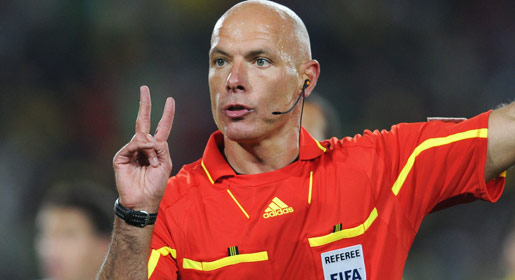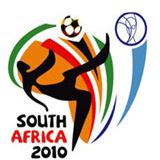
A picture taken on June 28, 2010 shows English referee Howard Webb gesturing during the 2010 World Cup round of 16 football match Brazil vs. Chile in Johannesburg. -Photo by AFP
JOHANNESBURG: England’s Howard Webb will referee Sunday’s World Cup final between the Netherlands and Spain at Johannesburg’s Soccer City, FIFA said on Thursday.
The 39-year-old from Rotherham, in nothern England, has been a FIFA-listed referee since 2005 and the former policeman regularly keeps law and order amongst the top stars of England’s Premier League.
Webb is widely-regarded as one of Europe’s top referees and took charge of May’s Champions League final between Inter Milan and Bayern Munich in Madrid.
At the World Cup, he refereed Spain’s 1-0 defeat to Switzerland in a group match and then oversaw Slovakia’s stunning 3-2 victory over Italy which confirmed the first round exit of the defending champions.
He was also the focus of film-makers when a Belgian documentary team recorded his movements at Euro 2008 for a film called “The Referees”.
Mexico’s Benito Archundia will take charge of Saturday’s third-place play-off between Germany and Uruguay in Port Elizabeth.
GOAL-LINE CHANGES
Refereeing at the 2014 World Cup will be radically altered with the possible introduction of goal-line technology and the use of extra officials, a top FIFA executive said.
FIFA have come under increasing pressure to introduce technology and video replays after a series of howlers at the World Cup.
England’s Frank Lampard had a perfectly good goal ruled out against Germany when the referee and his assistant failed to spot the ball had landed behind the line after coming off the crossbar.
Mexico were also furious when Carlos Tevez’s goal for Argentina was allowed to stand despite the striker being in an offside position.
FIFA general secretary Jerome Valcke said the Lampard incident had been a “bad day” for organisers.
“We’re talking about a goal not seen by the referee which is why we are talking about new technology,” Valcke told the BBC.
He also suggested that the use of two extra referees positioned on the goal-line — a system trialled last season in the Europa League and set to be used in the Champions League this coming season — might also be used in future World Cups.
“But let’s see if this system will help or whether giving the referee an additional four eyes will give him the comfort and make duty easier to perform, then why not?,” said Valcke.
In March this year, the International Football Association Board (IFAB) decided against introducing goal-line technology despite the widespread outrage following Thierry Henry’s handball which helped France beat Ireland in a World Cup play-off.
But Valcke admitted that the fast and furious pace of the modern game is posing new problems for FIFA.
“The teams and the players are so strong and so fast. The game is different and the referees are older than all the players,” said Valcke.
“The game is so fast, the ball is flying so quickly, we have to help them and we have to do something and that’s why I say it is the last World Cup under the current system.”
FIFA president Sepp Blatter said in the aftermath of the Lampard controversy that the opposition to goal-line technology would be reviewed.
“The only principle we are going to bring back for discussion is goal-line technology,” said Blatter.
“Football is a game that never stops and the moment there was a discussion if the ball was in or out, or there was a goal-scoring opportunity, do we give a possibility to a team to call for replays once or twice like in tennis?”
Blatter also said that in October or November FIFA would unveil a new global plan to improve refereeing.
“We want to improve the match control,” he said. “How to do it? After World Cup 1990, we created a task force called football 2000.
“We made some amendments like the back pass to goal keeper. It’s not today we have just started. It’s an ongoing process. We’ll come out in October/November with a new model how to improve high level refereeing.
“I cannot disclose more of what we are doing but something has to be changed.” -AFP





